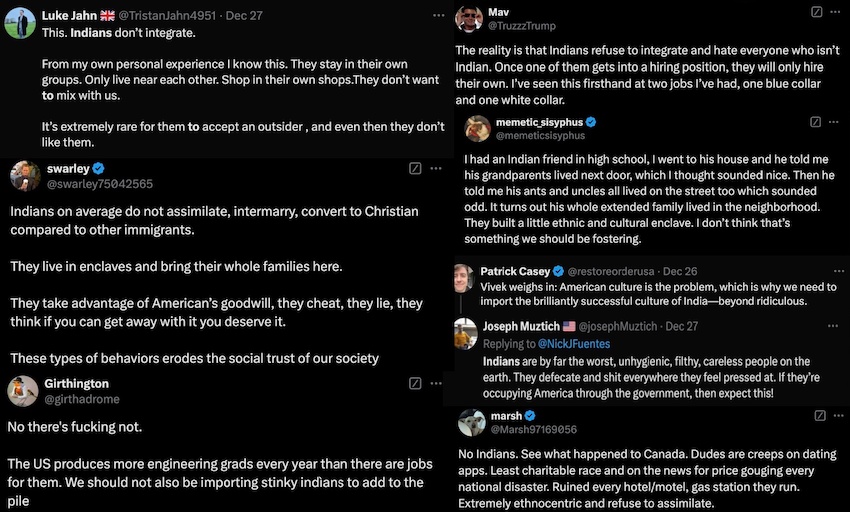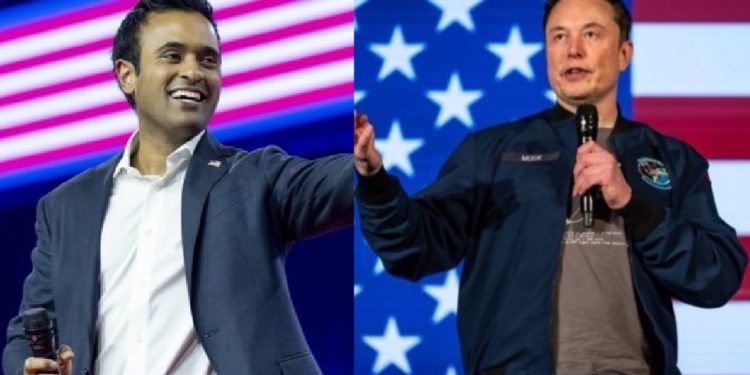Elon Musk and Vivek Ramaswamy have recently advocated for the expansion of the H-1B visa program, emphasising its importance in attracting top-tier engineering talent to the United States. Musk, who previously held an H-1B visa, stated, “There is a permanent shortage of excellent engineering talent. It is the fundamental limiting factor in Silicon Valley.”
This stance has led to a rift within the MAGA community, with some supporters expressing concerns that increasing H-1B visas could disadvantage American workers. Additionally, it has sparked a wave of hate messaging on social media platforms directed against Indian migrants, who are among the major beneficiaries of the H-1B visa program, further amplifying racial tensions and xenophobic rhetoric.
Far-right activist Laura Loomer criticised the appointment of Sriram Krishnan, an Indian-American tech entrepreneur, to President-elect Trump’s AI policy advisory team, labelling it as contrary to “America First” policies.
Musk responded to the backlash by condemning the racist undertones of the criticism, referring to detractors as “hateful racists” and “contemptible fools.”
President-elect Donald Trump has appointed Elon Musk and Vivek Ramaswamy to lead the newly established Department of Government Efficiency (DOGE). This department is tasked with dismantling government bureaucracy, reducing excessive regulations, cutting wasteful expenditures, and restructuring federal agencies.
Adding to this conversation, Raju Rajagopal, co-founder of advocacy organisation Hindus for Human Rights, took to social media to address the implications for the Indian-American community. In a strongly worded post on X, Rajagopal said:
“Hope that supporters of Hindu supremacist groups in the US, such as the Hindu American Foundation (HAF), are paying close attention to the verbal tsunami triggered by Musk, Vivek Ramaswamy, and Sriram Krishnan on the future of H1B visas.
Racism and xenophobia are now in full display by the MAGA people and other White supremacists, drowning out reasoned and data-driven opposition to H1B visas from many concerned Americans.”
Rajagopal urged Indian-American Hindus to recognise the real adversaries—racists and xenophobes—rather than focusing on interfaith tensions within the South Asian community. He added:
“When I see a few explicitly and graphically anti-Hindu memes, I am afraid that there will come a time when mainstream America will begin to recognize the hate, hype, hubris, and hypocrisy displayed by many in the Hindu community, who feel an outsized sense of entitlement.”
This situation highlights a complex intersection of immigration policy, economic interests, and racial dynamics. While the tech industry argues that H-1B visas are essential for maintaining innovation and competitiveness, opponents fear they may suppress wages and limit opportunities for American workers.
For Indian-Americans, particularly those of Hindu faith, this debate serves as a reminder of the potential pitfalls in aligning with ideologies that harbour elements of white supremacy or racism. Shared sentiments, such as Islamophobia, should not overshadow the broader implications of supporting movements that may ultimately act against minority interests.

It’s crucial to recognise that alliances based on selective agreements can lead to unintended consequences, especially when underlying prejudices exist. Engaging with and supporting inclusive policies that promote diversity and equal opportunity will better serve the community’s long-term interests.











